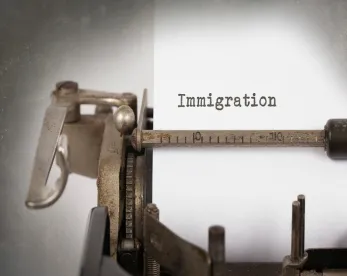The U.S. Supreme Court in a 5-4 decision has held that President Donald Trump’s Proclamation No. 9645, known as “Travel Ban 3.0,” can stand. Trump, et al. v. Hawaii, et al., No. 17-965 (June 26, 2018). Certain individuals from Iran, Libya, North Korea, Somalia, Syria, Venezuela, and Yemen will continue to be subject to the ban.
Chief Justice John Roberts delivered the opinion for the Court, joined by Justices Anthony Kennedy, Clarence Thomas, Samuel Alito, and Neil Gorsuch. Justices Kennedy and Thomas also filed a concurring opinion. Two dissenting opinions were filed: one by Justices Stephen Breyer and Elena Kagan, and one by Justices Sonia Sotomayor and Ruth Bader Ginsburg. This resulted in a final vote of 5-4.
The case is remanded to the U.S. Court of Appeals for the Ninth Circuit.
Background
Argued on April 25, 2018, Trump v. Hawaii was not only the last case to be heard by the Court this Term, but one of the most eagerly awaited oral arguments. The Court’s decision marks the culmination of ongoing litigation initiated January 2017 over the series of travel bans issued by the Trump Administration.
Four issues were presented to the Court:
- Are Respondents’ (the State of Hawaii, et al.) challenges to the Proclamation justiciable?
- Is the Proclamation a lawful exercise of the President’s authority to suspend the entry of aliens from abroad?
- Does the Proclamation violate the Establishment Clause of the Constitution?
- Is the global injunction too broad?
Justiciability – A Threshold Determination
If a case is not justiciable, no court, not even the Supreme Court, can hear it. The case would have been dismissed, and the travel ban simply would have remained in effect.
The government argued that the issue of whether the President can suspend the entry of aliens was not properly before the Court and that the respondents (the State of Hawaii, et al.) lacked standing because they suffered no constitutional injury. The respondents contended the ban violated the Immigration and Nationality Act (INA), that the Court “had the authority to enjoin ‘violations of federal law by federal officials,’ including the President,” and that their constitutional rights were violated because the State of Hawaii, as operator of the University of Hawaii, would suffer “proprietary injuries” and the individual plaintiffs would not be able to reunite with close family members.
The Supreme Court decided that it was not necessary to determine whether the statutory claims were reviewable, but held that the individual plaintiffs had standing to sue. The Court concluded that the Proclamation separated the plaintiffs from family members and that constituted a concrete injury that created proper standing.
Did the President exceed his authority?
The government argued that on the basis of both the Constitution and immigration laws, the President is granted very broad authority to determine what is in the best interests of the country when it comes to determining who may “enter” the United States. The President decided what countries to include in the ban based on a “worldwide review” conducted by various government agencies to determine which countries provided adequate information to allow U.S. officials to make informed decisions about the admissibility of their citizens to the United States. The government argued that because the countries included in the ban did not provide adequate information, it was in the best interest of the United States to exclude them. The respondents argued that, in taking this action, the President was exceeding his authority because the ban was not temporary in nature, and it was inconsistent with the other parts of the INA and, thus, inconsistent with Congressional intent. Moreover, they argued, the President’s undisputed authority with respect to immigration does not authorize him to undermine the whole statutory scheme of the INA.
The Supreme Court held that the Proclamation was a matter “within the core of executive responsibility” and that, given the Administration’s worldwide review process and the exemptions and waivers set forth in the Proclamation, it could “reasonably be understood to result from a justification independent of unconstitutional grounds.” Justices Breyer and Kagan disagreed. The fact that the Administration is hardly applying the Proclamation’s exemption and waiver system, they argued, supports “the claim that the Proclamation is a ‘Muslim ban,’ rather than a ‘security-based’ ban ….” In other words, the dissenters argued that the Administration’s justification was not reasonable enough.
Does the Proclamation violate the Establishment Clause?
The Establishment Clause prohibits the government from favoring one religion over another. The respondents argued that President Trump’s own statements indicated that the Proclamation, like its predecessors, was a discriminatory “Muslim ban” and that other reasons offered for the ban were mere pretexts. The government argued that because the ban rests on a reasonable determination made after a worldwide review, the Court cannot “look behind the President’s factual determination in search of pretext ….” The government pointed out that although many of the countries that are subject to the ban were Muslim-majority countries, the “vast majority” of Muslim-majority countries were not subject to the ban, indicating that the analysis really was based on those countries that did not provide adequate information to the United States or otherwise presented risk ― thus satisfying the “facially legitimate and bona fide reason” test that applies in this area of the law.
The Supreme Court declined to rest solely on the “facially legitimate and bona fide reason” test. It analyzed the Proclamation by applying rational basis review. The Court held that there was no need to look beyond the Proclamation’s facial neutrality. In dissent, Justices Sotomayor and Ginsburg emphasized that the United States was “built upon the promise of religious liberty” and that the Court’s decision “fails to safeguard that fundamental principle.”
Is the injunction too broad?
The government had argued that even if the injunction is allowed to stand, it should “protect” only the named parties, not all nonparty aliens abroad, and that the Court “should reject the troubling but increasingly prevalent practice of legislation-by-injunction.” The respondents maintained that when an executive action is unconstitutional or violates a statute, it must be struck down “on its face” and that more limited relief would lead to an irrational fragmentation of the immigration system.
Justice Thomas, in a concurring opinion, addressed this issue. He expressed skepticism over a U.S. District Court’s ability to authorize such a broad injunction “preventing legal questions from percolating through the federal courts, encouraging forum shopping, and making every case a national emergency….”
Implications
The restrictions in the Proclamation will remain in effect for the indefinite future (and more countries may be added or removed).
Current restrictions:
Iran: Entry as immigrants and nonimmigrants is suspended, except for those in valid student (F and M) or exchange visitor (J) status (although these individuals should be subject to enhanced screening and vetting).
Libya and Yemen: Entry as immigrants and nonimmigrants in business and tourist status is suspended.
Syria and North Korea: Entry as immigrants or nonimmigrants is suspended.
Somalia: Entry as immigrants is suspended and decisions regarding entry as nonimmigrants will be subject to additional scrutiny.
Venezuela: Entry in tourist or business visitor status is suspended for officials of certain government agencies involved in screening and vetting practices and their immediate family members. Nationals of Venezuela who hold visas should be subject to additional measures to ensure traveler information remains current.
There are exemptions and limitation. According to the Proclamation, the restrictions will not be applied to:
- Current lawful permanent residents (Green Card Holders)
- Current visa holders
- Dual nationals travelling on a passport from an unaffected country
- Those travelling on diplomatic or diplomatic-type visas
- Asylees
- Already-admitted refugees
- Individuals granted protection under the Convention Against Torture
- Individuals paroled or admitted to the U.S.
If one of the above exemptions does not apply, a Consular Officer should consider whether a waiver might be appropriate in order to grant entry to the U.S. by asking:
- Is there undue hardship?
- An unusual situation exists that compels immediate travel and delay would defeat the purpose of the travel.
- Is there a national interest?
- A U.S. person or entity would suffer hardship if the applicant could not travel until after restrictions are lifted.
- Does the applicant pose a threat to national security or public safety?
- This includes a consideration of the information-sharing and identity management protocols of the individual’s country of nationality.
There are no categorical or blanket waivers, but the ban itself provides specific examples of when a waiver might be appropriate, assuming the above standards are also met. Examples include:
- Applicant has previously been admitted for work, study, or other long-term activity and plans to continue that activity.
- Applicant previously established significant contacts with the U.S. for work, study, or other lawful activity.
- Applicant seeks to enter the U.S. for significant business or professional obligations and denial of entry would impair those obligations.
- Applicant seeks to enter the U.S. to visit or reside with a close family member (e.g., spouse, parent, or child).
- Applicant is an infant, young child, or adoptee, or an individual needing urgent medical care.
- Applicant has been employed by or on behalf of the U.S. government.
- Applicant is traveling for purposes related to an international organization under the International Organization Immunities Act (IOIA), travelling for purposes of conducting meetings or business with the U.S. government, or travelling to conduct business on behalf of an international organization not designated under the IOIA.
- Applicant is a Canadian permanent resident who applies for visa in Canada.
- Applicant is traveling as a U.S. government-sponsored exchange visitor.
- Applicant is traveling at the request of a U.S. governmental department or agency for law enforcement, foreign policy, or national security purposes.
When being considered for a waiver, individuals may be asked to provide additional personal information. While there is no specific waiver application, individuals are encouraged to submit information to show they qualify for an exemption or waiver. Individuals being considered for a waiver should be prepared to wait as the adjudication may take additional time to process.
To date, not many waivers have been granted. This fact was noted during oral argument by Justice Breyer, citing amicus briefs from the business community. This fact was again asserted in Justice Breyer’s dissent, questioning whether there was an appropriate waiver process in place. Now that the ban has been validated, the waiver procedure will be much more important.
What effect this ruling will have on the U.S. economy, including tourism to the United States, remains to be seen.






 />i
/>i

